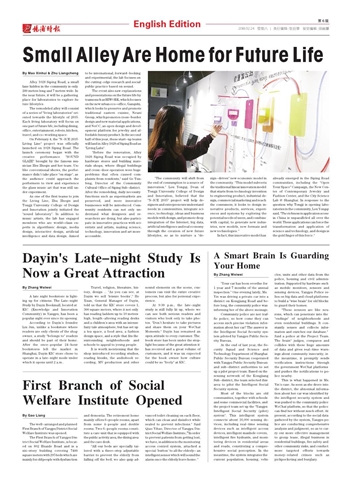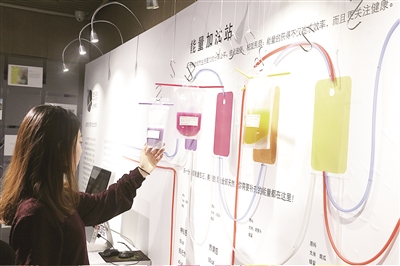Alley 1028 Siping Road, a small lane hidden in the community is only 200 meters long and 7 meters wide. In the near future, it will be a gathering place for laboratories to explore future lifestyles.
The remodeled alley will consist of a series of "living laboratories" oriented towards the lifestyle of 2035. Each living laboratory will focus on one part of future life, including dining, office, entertainment, robots, kitchen, travel, and co-working space.
On February 4, the "N-ICE 2035 Living Line" project was officially launched on 1028 Siping Road. The launch ceremony began with the creative performance "SOUND GLAZE" brought by the famous musician Zhu Zheqin and her team. Unlike conventional shows, the performance didn't take place "on stage", as the audience could approach the performers to view and experience the glass music art that was still under experiment.
As one of the first teams to join the Living Line, Zhu Zheqin and Tongji University College of Design and Innovation jointly initiated the "sound laboratory". In addition to music artists, the lab has engaged members who are world-class experts in algorithmic design, media design, interactive design, artificial intelligence and data design. Aimed to be international, forward-looking and experimental, the lab focuses on the cutting-edge research and social public practice based on sound.
The event also saw explanations and presentations on the future life by teams such as HIWORK, which focuses on the new urban eco-office, Ganqishi, which looks to preserve and promote traditional eastern cuisine, Neuni Group, which promotes cross-border design and new material applications, and NoCC, an open design and development platform for jewelry and affordable luxury product. In the second half of this year, these start-up teams will land in Alley 1028 of Siping Road as "Living Labs".
"Before the renovation, Alley 1028 Siping Road was occupied by hardware stores and building materials shops, where illegal buildings and cross-door operation were huge problems that often caused complaints from residents," said Ge Yunfeng, Director of the Community Cultural Office of Siping Sub-district. After the remodeling, daily necessity functions such as supermarkets are preserved, and more innovative businesses will be introduced. Community residents can not only understand what designers and researchers are doing, but also participate in innovative practices with scientists and artists, making science, technology, innovation and art more accessible.
"The community will shift from the end of consumption to a source of innovation." Lou Yongqi, Dean of Tongji University College of Design and Innovation, believed that the "N-ICE 2035" project will help designers and entrepreneurs understand needs in communities, integrate science, technology, ideas and business models with design, and promote deep integration of the Internet, big data, artificial intelligence and real economy through the creation of new future lifestyles, so as to nurture a "design-driven" new economic model in the community. "This model subverts the traditional linear innovation model that starts from technology invention to engineering product, industrial design, commercial marketing and reach the consumers; it looks to design innovative products, services, experiences and systems by exploring the potential needs of users, and combine with capital, to generate new industries, new models, new formats and new technologies. "
In fact, this innovative model has already emerged in the Siping Road communities, including the "Open Your Space" Campaign, the New Center of Contemporary Jewelry and Fashion Center, and the City Science Lab @ Shanghai. In response to the question why Tongji is opening laboratories in the community, Lou Yongqi said, "The richness in application scene in China is unparalleled all over the world. These applications can force the transformation and application of science and technology, and design is the gold finger of this force."


